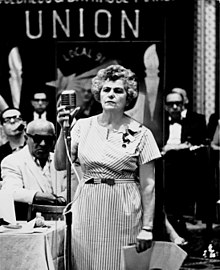
On this day in labor history, the year was 1896.
That was the day anarchist and labor activist Rose Pesotta was born.
Her name, Rakhel Peisoty, was changed, like so many others’, at Ellis Island.
She had fled tsarist Russia in 1913 as a teenager and soon found work in New York City’s garment shops.
She readily joined the ILGWU, becoming a national organizer by 1920.
In the late 1920s, Rose went to Los Angeles in an attempt to organize Latina sweatshop workers.
There she helped women workers establish a bilingual labor journal and assisted them in winning a key strike for recognition and higher wages in 1933.
She soon ascended to the position of union vice president and worked closely with the newly formed CIO.
Rose traveled far and wide to organize garment workers.
She led successful strikes throughout the United States and in Montreal and Puerto Rico.
By 1936, she was on the picket lines with striking rubber workers in Akron, Ohio and autoworkers in Flint, Michigan.
She increasingly found herself at odds with ILGWU head, David Dubinsky and other top male union officials over persistent sexism, her radical politics and her opposition to the no-strike pledge during World War II.
Rose resented the fact that though women comprised the overwhelming majority of the union’s membership, she continued to be the only woman union officer.
Frustrated by the chauvinism she experienced, Rose resigned from her post as vice president and later from the ILGWU executive board in 1944.
She continued as a sewing machine operator, remained active at the local level and published two memoirs.
Later in life, she aligned herself with the Civil Rights Movement.
Rose Pesotta died of cancer in 1965.
More Episodes
 2024-04-08
2024-04-08
 2024-04-07
2024-04-07
 2024-04-06
2024-04-06
 2024-04-05
2024-04-05
 2024-04-04
2024-04-04
 2024-04-01
2024-04-01
 2024-03-31
2024-03-31
 2024-03-30
2024-03-30
 2024-03-25
2024-03-25
 2024-03-24
2024-03-24
 2024-03-22
2024-03-22
 2024-03-21
2024-03-21
 2024-03-20
2024-03-20
Create your
podcast in
minutes
- Full-featured podcast site
- Unlimited storage and bandwidth
- Comprehensive podcast stats
- Distribute to Apple Podcasts, Spotify, and more
- Make money with your podcast
It is Free
- Privacy Policy
- Cookie Policy
- Terms of Use
- Consent Preferences
- Copyright © 2015-2024 Podbean.com




